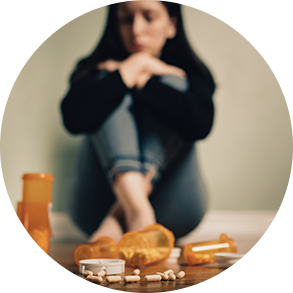Addiction is a chronic brain disease in which a person chronically obtains and uses drugs or alcohol or chronically engages in addictive behaviors like gambling. Addiction can change how the brain works, not only leading to physical and chemical changes but also impacting the individual’s behavior. After a while of use, the drug in question becomes the individual’s focus, impacting their health as well as their career, finances, and relationships. Opioid abuse is among the most common and problematic forms of addiction in the U.S., one that our opioid addiction rehab in Sebring is actively working to reduce.

What Are Opioids?
Opioids are a class of drugs naturally found in the opium poppy plant. These drugs work in the brain to produce a variety of side effects, including pain relief.
Opioids can be either prescription medications – often referred to as painkillers – or then can be so-called street or illicit drugs, such as heroin and krokodil (desomorphine). Many prescription opioids are used to block pain signaling from the body to the brain.
Opioid medications are normally prescribed to individuals who suffer from moderate to severe pain. In addition to controlling pain, however, opioids can make users feel relaxed, euphoric, or “high,” a side effect that’s addictive.
Opioids also act as depressants on the central nervous system, leading to side effects like slowed breathing, constipation, nausea, confusion, and drowsiness. Opioids are sometimes referred to as narcotics.
While they do relieve pain, they don’t fall under the same category as over-the-counter painkillers like aspirin and Tylenol. The most commonly abused opioids include:
- Prescription opioids, such as Vicodin and OxyContin
- Fentanyl, a synthetic opioid that’s 50 to 100 times more potent than morphine
- Heroin, a common and illegal opioid
Signs of Opioid Abuse
Opioid use does not come without its risks. Opioids are highly addictive substances due to their mechanism of action in the brain. When ingested, opioids are attached to opioid receptors in the central nervous system and other areas of the body, not only alleviating pain but also spiking dopamine levels in the brain.
When this chemical is released, the individual’s mood improves, leading to an overall sense of well-being. This high is what makes opioids so addictive, and long-term use of these drugs can eventually lead to an opioid use disorder.
Opioid use disorder is a medical condition in which the individual is not able to abstain from using opioids and behaviors centered around opioid use that interferes with day-to-day life. A person with an addiction to opioids may exhibit certain signs and behaviors.
Common signs of opioid addiction include:
- Changes in sleep habits
- Mood swings
- Isolation and withdrawal from loved ones
- Withdrawal symptoms
- Decreased libido
- Drowsiness
- Frequent flu-like symptoms
- Lack of hygiene
- New financial difficulties
- Stealing from family, friends, or businesses
- The inability to control opioid use
- Uncontrollable cravings
- Unexplainable weight loss
- Reduced hygiene
- Reduced performance at school, work, and/or home
Our Sebring drug rehab for opioid use offers medically assisted detox and addiction treatment led by a staff of experts dedicated to ensuring the safety and recovery of our patients. Our facility may utilize various medications to aid in withdrawal treatment, prevent relapse, and keep clients on track with their programs. If you or a loved one displays any of the listed signs of opioid abuse and addiction, our inpatient opioid rehab is here to help.
Opiate Rehab Center in Sebring, FL
The first step of treatment at our Sebring, FL drug rehab is a clinical assessment to determine the individual’s physical and mental state. With our clinical assessments, we determine the level of addiction care best suited for the person’s needs.
Following this assessment, most patients – especially those with severe addictions – will undergo opioid detox, in which they’ll receive medication-assisted treatment for their withdrawal symptoms. These symptoms are often severe enough to cause the person to relapse simply to avoid them.
After detox programs come therapy, during which clients meet with counselors and therapists for several days and sessions per week to better understand the contributing factors to their addiction and develop healthy habits. Our opioid use disorder therapies include both individual and group sessions to not only contribute to personal growth but also to expose clients to others who can understand and empathize with their experiences.
For more information about Banyan’s nationwide opiate addiction treatment centers or our Highland County, Florida, substance abuse therapy, contact Banyan Treatment Centers today.
Related Reading:





